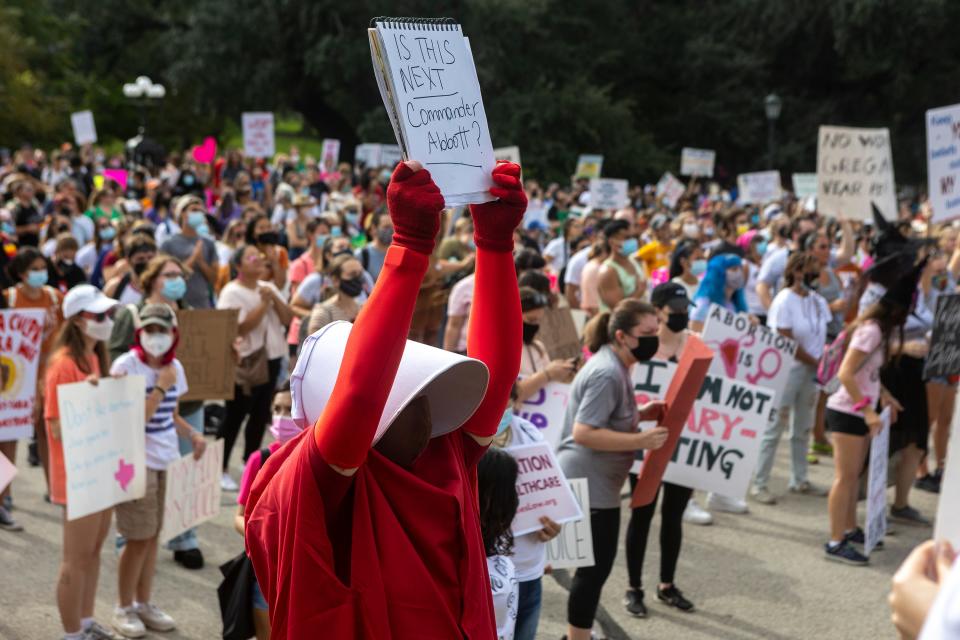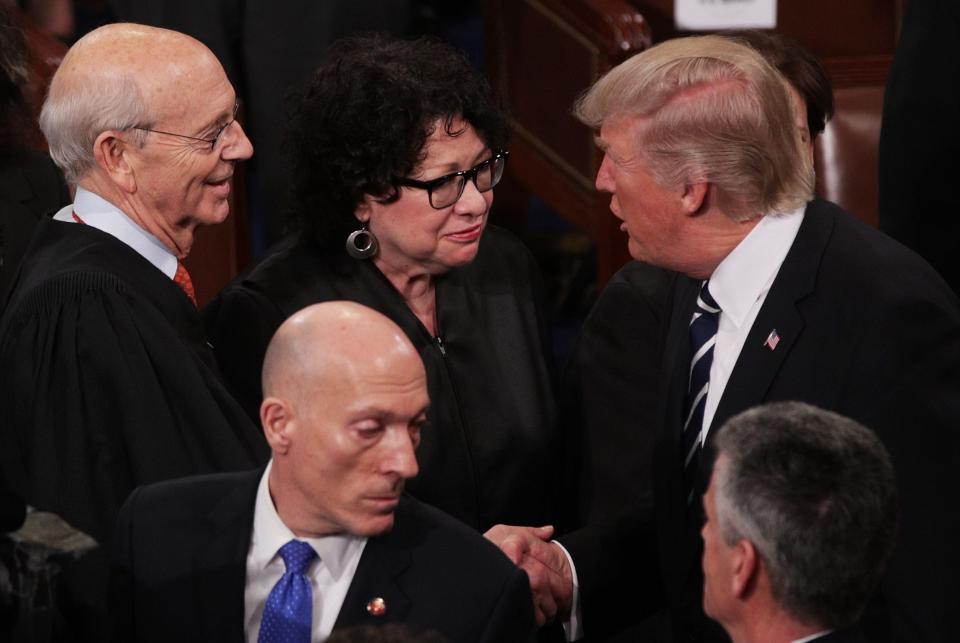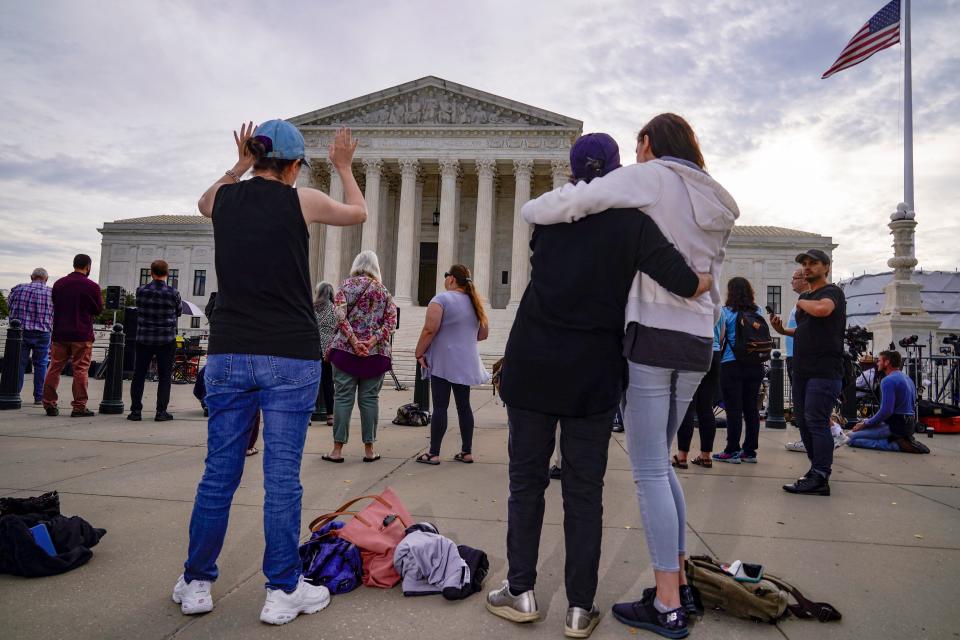As Supreme Court hears Texas abortion cases, questions linger about vitality of Roe v. Wade
WASHINGTON – It's one of the nation's most divisive issues, but when the Supreme Court meets Monday to hear oral arguments in a pair of lawsuits dealing with abortion, the justices will likely do so in terms that millions of Americans will find difficult to follow.
Rather than debating whether Texas' ban on abortion after six weeks of pregnancy is constitutional, the court will focus on who may sue whom. Instead of invalidating the law or upholding it, the court will decide only whether to block its enforcement – for now.
Even though the two lawsuits up for argument may be decided on narrow grounds, observers will be listening closely for signals on where the justices stand on broader questions about abortion. Those positions will come into play in a blockbuster case to be argued Dec. 1 challenging Mississippi's ban on the procedure after 15 weeks of pregnancy.
Advocates are looking for any sign about the court's commitment to its 1973 decision in Roe v. Wade, which made abortion legal nationwide, and its 1992 ruling in Planned Parenthood v. Casey, which set out when and how states may limit access to it.
Solicitor general: Biden's pick for government's lawyer poised for Senate approval
Anniversary: Justice Thomas sticks to plan after 30 years on Supreme Court
The outcome of the cases argued Monday will have enormous and immediate consequences in Texas, where doctors have largely stopped performing abortions once cardiac activity is detected in an embryo. That has forced many Texans to cross state lines if they want to end a pregnancy after six weeks.
The U.S. Court of Appeals for the 5th Circuit allowed the law to remain in effect.
"Every day that this law is in place means that Texans are hurting and being hurt," said Allison Gilbert, an OB/GYN and medical director at Southwestern Women's Surgery Center in Dallas. "What I'm watching for is a ... decision that this law is going to be enjoined so we can resume abortion care and do the work we're trained to do."
In an unusual move, the high court agreed Oct. 22 to hear a suit filed by the Biden administration in September and another lawsuit from clinics. The court asked lawyers to submit legal papers on an expedited basis and shifted its calendar to accommodate the cases. How quickly the court rules will depend on the extent to which the justices agree.
Conservatives and progressives are already looking ahead to the Mississippi case, Dobbs v. Jackson Women's Health Organization, which deals more directly with the constitutional debate over abortion. A ruling against Texas won't necessarily mean Mississippi's ban is in trouble.
But the arguments themselves may offer clues about where the court is heading.
The fight over Texas' law "highlights the importance of the upcoming Dobbs case," said Carrie Severino, president of the conservative Judicial Crisis Network. "If the court does not address the constitutional problems with Roe and Casey squarely and decisively in Dobbs, we can expect to see the Texas case back before the court again."
What's the question?
When the Supreme Court agrees to hear oral arguments in a case, the question it must decide is usually well defined. But it's a little less clear in the Texas suits.
The justices signaled they intend to limit the focus of the disputes over the Texas ban to procedural matters about who can sue and be sued. But one of the cases, filed by abortion providers, asks whether Texas was permitted to pass a law that "prohibits the exercise of a constitutional right." That leaves some wiggle room for a broader discussion – maybe.
Kentucky: Supreme Court signals willingness to let state AG defend abortion law
A big part of the legal conundrum presented by the Texas law deals with enforcement. Rather than criminalizing abortion, Texas incentivizes private citizens to sue anyone who helps a person get an abortion after six weeks. That has had the practical effect of discouraging clinics from performing the procedure and making it harder for abortion rights groups to persuade courts to block enforcement of the law.

How much the justices focus on that legal quagmire versus how much they veer into questions about the constitutionality of abortion may reveal a lot about where they're headed, experts said.
"I'll be interested to see to what extent it sounds like they're able to disaggregate the abortion and procedural pieces," said Mary Ziegler, a Florida State University law professor who joined a brief opposed to Mississippi in the appeals court. "The more they collapse this into another abortion case, the better chance Texas probably stands."
Richard Garnett, a Notre Dame Law School professor, agreed.
"I will be interested in the extent to which the lawyers' arguments, and the justices' questions, wander from the precise, technical questions the court agreed to review," said Garnett, who co-authored a brief in support of Mississippi in the Dobbs case. "That is, will the lawyers use this unusual argument as an opportunity to pre-argue the upcoming Dobbs case, which is quite clearly about the merits and future of Roe and Casey."
Watching the liberals
Though conservatives have a 6-3 advantage on the high court, many eyes will be trained on the liberals, especially Associate Justices Stephen Breyer and Elena Kagan.
That's because neither joined a recent dissent from Associate Justice Sonia Sotomayor excoriating the majority for declining to stop enforcement of the law while the court decides the cases. "Every day the court fails to grant relief is devastating," Sotomayor wrote, "both for individual women and for our constitutional system as a whole."
Breyer and Kagan had made their opposition to the law clear in earlier dissents.
Explainer: A road map to the cases pending over Texas' six-week ban
Many court watchers believe there's a good reason for their silence now: By keeping the focus on the procedural questions and steering around the third-rail of abortion, they may be able to form a coalition with conservatives to halt the law.

If that is the case, Breyer and Kagan won't say so from the bench, but they could signal their strategy by posing questions that appeal to their conservative colleagues. Another dynamic to watch: whether Sotomayor reprises the points she raised in her scorching dissent and brings questions about the continuing constitutionality of abortion squarely into Monday's arguments.
Thumbing a nose?
One of the themes raised in the cases is whether Texas is thumbing its nose at the Supreme Court by crafting its abortion ban in a way that makes it harder for the court to review it.
It's a question that has grabbed attention on both ends of the political spectrum. A prominent gun rights group recently filed a brief supporting the abortion clinics because it fears similarly structured laws would limit its ability to ask courts to block gun restrictions approved in Democratic states.

Wave: 'Huge numbers' of abortion cases heading to Supreme Court to test Roe
"It's one thing for a state to say we disagree with what the Supreme Court has decided and we're going to enact a law contrary to the Supreme Court, creating an opportunity for the Supreme Court to reconsider the issue," said Neal Devins, a law professor at William & Mary Law School. "But that's not what Texas is doing. Texas is saying: 'We don't want the Supreme Court to weigh in on whether this is constitutional or unconstitutional. We want to create, essentially, a law that no one is going to be able to get into court to challenge.'"
One element to watch Monday is how much currency that argument has with conservatives. Questions from Associate Justices Clarence Thomas, Neil Gorsuch and others about the impact on rights beyond abortion may signal an evolving compromise to strike down the Texas law on limited grounds, experts say.
The court, Devins said, could "theoretically come together" to say that Texas cannot foreclose federal courts' power to protect rights. "You might see all the justices come together to make a statement like that," he said.
This article originally appeared on USA TODAY: Texas abortion law: Your guide to oral arguments at the Supreme Court

